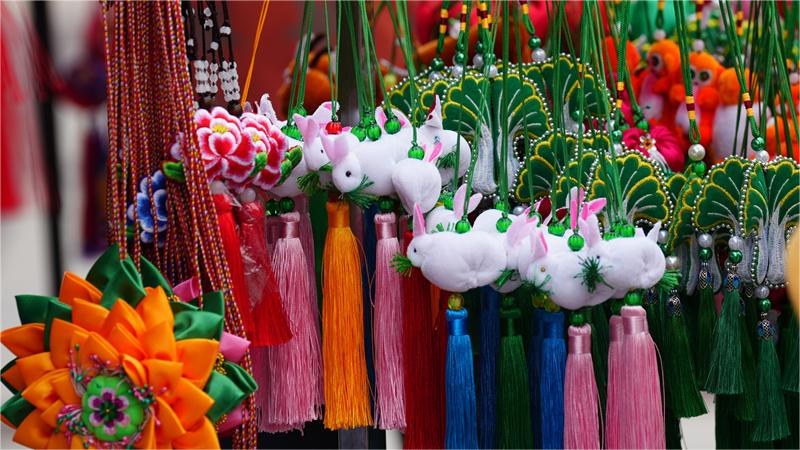Mushrooming industries in SW China help disposal of end-of-life vehicles
CHONGQING, June 11 (Xinhua) -- Chuangxin Avenue of Tongnan District, southwest China's Chongqing Municipality, is both the end and a new starting point for end-of-life vehicles.
Waste cars from all over the country are sent here. They undergo a series of processes including inspection, cleaning, disassembly, re-manufacturing, and so forth. Vehicle parts are then sent back to the market, batteries are put into echelon use, and metal accessories are smelted.
"In the past, people often treated the end-of-life vehicles as waste steel each worth less than 3,000 yuan (about 422 U.S. dollars)," said Zhou Bo, chairman of Chongqing Hongxi Automobile Technology Co., Ltd., one of the vehicle recycling companies situated at the avenue. "Re-manufacturing can increase their value by more than three times."
Data from the Ministry of Public Security show that the number of motor vehicles in China hit 435 million in 2023. As estimated by Cui Dongshu, secretary general of China Passenger Car Association, about 7.56 million vehicles were scraped in 2023, up 32 percent from the prior year.
In this context, there is a big market for the disposal of scraped vehicles, according to Cui.
Last year alone, Hongxi recycled about 120,000 vehicles. When thinking of a large number of end-of-life vehicles pooled in a factory, one may expect the company to be a very chaotic, dirty, and messy place. However, the factory owned by Hongxi prides itself on modernization and digitalization. The car bodies and parts are classified and all affiliated with a QR code. Scanning the code offers information such as where a part is from and where it is going.
Vehicle accessories that are in good condition such as steering wheels, ABS pumps, instrument panels, to name a few, will be put on Car Nest. Car Nest is an online platform set up by Hongxi, where users can sell scraped cars and buy vehicle accessories.
"Car Nest changed the way we trade end-of-life vehicles and accessories by creating transparency in pricing and facilitating the connection between the company and vehicle owners," said Zhou.
Other parts and materials will be re-manufactured into secondary aluminum, rubber products, and reprocessed plastics.
New energy vehicles (NEVs) have witnessed explosive growth in recent years. China had 20.41 million NEVs by the end of 2023, as data from the Ministry of Public Security shows. In general, after five to eight years, the maximum capacity of NEV batteries will drop to less than 80 percent, which means they have to "retire." Therefore, an upsurge of retired NEV batteries is on the horizon.
Against this backdrop, Hongxi also re-purposes spent NEV batteries for echelon use and transforms them into healthy ones that can be used in electric motorcycles, streetlamps, and family-use electric generators.
"Our company plans to invest 2.1 billion yuan to build a new energy recycling technology industrial park, eyeing disassembly of NEVs, re-manufacturing of accessories and echelon use of batteries, with an annual production value of 5 billion yuan," said Xu Yongming, chief engineer of Chongqing Beisiyuan New Energy Co., Ltd.
Chongqing Lengjing Technology Co., Ltd., which went into trial operation in January this year, focuses more on the recovery of raw materials used in batteries to alleviate the shortage of battery materials.
"At present, the company has built a production line for hydro-metallurgical recovery of lithium carbonate from spent ferrous lithium phosphate batteries," said Liu Hao, general manager of Chongqing Lengjing Technology Co., Ltd. "The project is both profitable and eco-friendly," he added.
"The 'old vehicle' market is breeding new and diverse industries," said Wen Tianping, Party secretary of Tongnan District, adding that Tongnan will further prolong the industrial chain of end-of-life vehicle industries.
China aims to double the 2023 number of recycling scraped vehicles in 2027, according to an action plan published by the State Council in March.
Photos
Related Stories
- Chinese Great Wall Motor denies allegations of European market withdrawal
- 16th Hohhot Int'l Auto Show kicks off in N China
- Nation to boost policy support for smart cars
- Han Wei clinches 4th championship as Taklimakan Rally concludes
- Interview: U.S. high tariffs on Chinese EVs ineffective, harmful -- Croatian expert
Copyright © 2024 People's Daily Online. All Rights Reserved.









